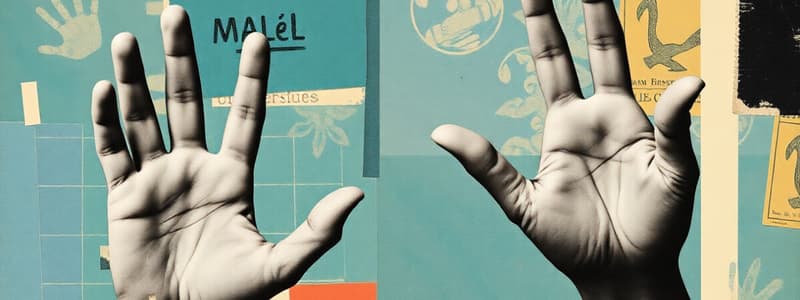Podcast
Questions and Answers
What is considered the heart of Deaf culture?
What is considered the heart of Deaf culture?
- Sign language (correct)
- Historical records
- Artistic expression
- Community support
Which century marked the formal establishment of education for deaf individuals?
Which century marked the formal establishment of education for deaf individuals?
- 17th Century
- 18th Century (correct)
- 20th Century
- 19th Century
What core value emphasizes the need for effective communication within deaf communities?
What core value emphasizes the need for effective communication within deaf communities?
- Community support
- Cultural pride
- Communication access (correct)
- Artistic expression
Which organization played a significant role in advocating for deaf rights in the 20th century?
Which organization played a significant role in advocating for deaf rights in the 20th century?
What aspect of deaf culture binds individuals together?
What aspect of deaf culture binds individuals together?
What is the significance of sign language in the deaf experience?
What is the significance of sign language in the deaf experience?
Which of the following is NOT a challenge faced by deaf individuals today?
Which of the following is NOT a challenge faced by deaf individuals today?
What impact did the rise of deaf organizations in the 20th century have on deaf culture?
What impact did the rise of deaf organizations in the 20th century have on deaf culture?
What is a significant way in which sign language contributes to the Deaf community?
What is a significant way in which sign language contributes to the Deaf community?
Which of the following best describes the role of cultural identity in the Deaf experience?
Which of the following best describes the role of cultural identity in the Deaf experience?
What challenge do Deaf individuals often face in employment?
What challenge do Deaf individuals often face in employment?
How does empowerment play a role in Deaf culture?
How does empowerment play a role in Deaf culture?
What does intersectionality in the context of Deaf culture refer to?
What does intersectionality in the context of Deaf culture refer to?
What is one barrier that Deaf individuals face in accessing healthcare?
What is one barrier that Deaf individuals face in accessing healthcare?
What form does the celebration of Deaf culture take?
What form does the celebration of Deaf culture take?
What is a common societal perception that contributes to social stigma against Deaf individuals?
What is a common societal perception that contributes to social stigma against Deaf individuals?
Flashcards are hidden until you start studying
Study Notes
Introduction to Deaf Culture
- A community characterized by unique languages, social norms, and values
- Includes sign languages, shared experiences, traditions, and artistic expressions.
- Understanding is essential for fostering inclusivity and respect in a hearing-dominated society.
History and Origins of Deaf Culture
- Deaf individuals have existed throughout history
- Early civilizations developed early sign systems
- Formal education for deaf individuals began in the 18th century, fostering distinct deaf culture, emphasizing community, and shared learning experiences.
- The 20th century marked a significant leap in advocacy for deaf rights and recognition of Deaf culture
- Organizations such as the National Association of the Deaf (NAD) emerged.
Core Values and Beliefs in Deaf Communities
- Commitment to communication access
- Importance of community support
- Respect for sign language as a legitimate and rich linguistic form.
- Emphasis is placed on shared experiences to promote understanding and cultural pride.
Sign Language: The Heart of Deaf Culture
- Sign language serves as a vehicle for expressing identity, emotions, and creativity.
- Allows individuals to connect deeply with one another, fostering a sense of belonging.
- Different countries have their own sign languages, integral to respective deaf cultures.
- The use of sign language strengthens community bonds and preserves cultural narratives.
Cultural Identity and the Deaf Experience
- Deaf identity often revolves around a strong sense of community.
- Members frequently participate in social events, gatherings, and activities that reinforce their cultural ties and foster collective identity.
- Deaf culture intersects with various identities, including race, gender, and socioeconomic status, enriching the experiences and perspectives of its members and leading to a more diverse cultural narrative.
- Many deaf individuals encounter challenges while navigating predominantly hearing environments.
- Building bridges between cultures involves education and advocacy to promote awareness of deaf experiences and identities.
- Empowerment through pride in deaf culture encourages individuals to become advocates for their rights, embracing their identity and demanding access to resources and opportunities.
Challenges Faced by Deaf Individuals Today
- Access to quality education remains a significant challenge for many deaf individuals, often due to insufficient resources or lack of trained educators fluent in sign language.
- Deaf individuals frequently face barriers to employment, including misconceptions about their capabilities and limited job opportunities, leading to higher unemployment rates compared to hearing peers.
- Access to healthcare can be daunting for deaf individuals, often hindered by communication barriers with providers and a lack of accessibility in medical settings.
- Negative stereotypes and misconceptions surrounding deafness contribute to social stigma, further isolating individuals from the broader community and perpetuating feelings of exclusion.
Celebrating Deaf Culture: Art and Expression
- Deaf culture is widely expressed through various art forms, including visual arts, literature, and performance.
Studying That Suits You
Use AI to generate personalized quizzes and flashcards to suit your learning preferences.




